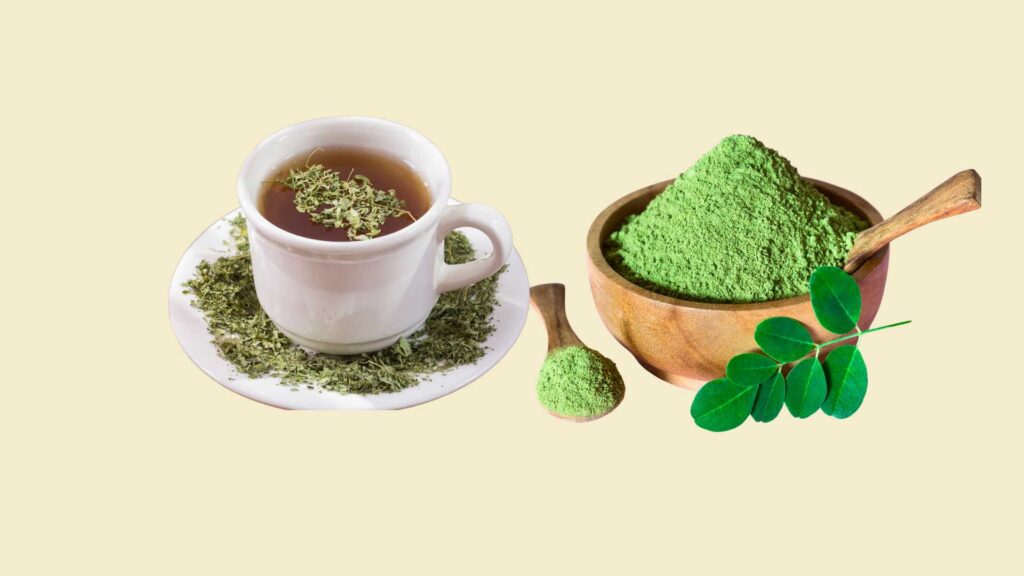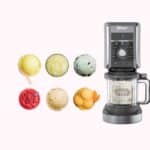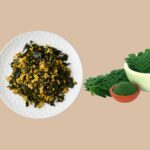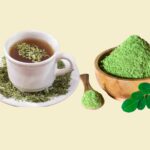Moringa tea has recently surged in popularity due to its myriad health benefits and delightful flavour. Derived from the nutritious leaves of the Moringa Oleifera tree, Moringa tea is packed with antioxidants, anti-inflammatory compounds, and key vitamins and minerals that support overall wellness. In this article, we’ll explore everything you need to know about sourcing, brewing, and incorporating this super leaf into your routine and tell you how to make Moringa tea.
Table of Contents
Brief overview of Moringa tea
Moringa tea is made from the dried leaves of the Moringa tree, native to India but now grown worldwide in tropical and subtropical regions. The leaves are highly nutritious, containing vitamins A, B, and C, minerals like calcium, potassium, and iron, and powerful antioxidants like quercetin and chlorogenic acid. Steeping the dried leaves makes a mild, earthy, green tea-like beverage that has many medicinal uses.
Health benefits and popularity
Thanks to its stellar nutritional profile, Moringa tea has been associated with benefits like improved digestion, heart health, immune function, blood sugar control, anti-ageing effects, skin health, and antioxidant protection. Moringa’s versatility, affordability, and sustainability have fueled its popularity as the new superfood around the world.
Understanding Moringa
What is Moringa?
Moringa oleifera, commonly known as the drumstick tree or horseradish tree, is a fast-growing tree native to Northern India. Nearly every part of the plant is edible and nutritious, but the most prized part is the leaf. Moringa leaves have been part of traditional medicine in Asian and African cultures for thousands of years. Now, the leaves are dried and condensed into powders and supplements to harness the plant’s therapeutic effects.
Nutritional content and value
Ounce for ounce, Moringa leaves contain an incredible amount of vital nutrients, sometimes even 10 times the amount in traditional superfoods. Moringa leaves are rich sources of vitamin C, beta-carotene, protein, calcium, potassium, and amino acids like methionine and cystine. They also contain various phenolic compounds like quercetin and powerful antioxidants.
Sourcing Quality Moringa
Choosing the right Moringa leaves
When shopping for Moringa, look for dried leaf powder or flakes made from fresh, young leaves, which have the highest nutritional content. Lower quality Moringa may come from older leaves and stems that have lower amounts of nutrients. It’s also key that the leaves are properly dried and stored to retain nutrients.
Organic vs. conventional Moringa
Opting for organic Moringa will ensure your tea is free of pesticides, herbicides, and other chemicals. As Moringa plants easily absorb contaminants from soil and water, organic cultivation is ideal. While organic Moringa costs more, the peace of mind and health benefits are well worth it. Conventional Moringa should be avoided when possible.
The Art of Harvesting
Optimal time for harvesting Moringa leaves
Moringa leaves should be harvested when plants reach 1-2 meters in height, typically around 75 days after seeding. Only the top leaf clusters and soft, tender leaves should be hand-picked. Older leaves lower on branches will be tough and fibrous. For the best flavour and nutrition, harvest leaves early in the morning.
Proper techniques for harvesting
When harvesting Moringa leaves, use scissors or pruning sheers to cut at the main stem. Avoid ripping leaves directly off branches, which can damage the plant. Handle leaves gently to avoid bruising. Leave some leaves on stems to allow for regrowth. Trimming plants promotes bushier growth.
Drying and Storing Moringa Leaves
Importance of proper drying
It’s vital to dry Moringa leaves quickly after harvest to preserve nutrients. Leaves should be dried in the shade at room temperature, out of direct sunlight. Drying helps concentrate nutrients and flavours and prevents spoilage before leaves are ground into powder.
Best practices for storage
Proper storage also preserves the integrity of dried Moringa leaves. Store leaves whole or powdered in sealed opaque containers away from sunlight, heat, and moisture. Moringa powders should retain their bright green colour. Discoloration indicates nutrient loss. Store in the refrigerator or freezer to maximize shelf life.
Moringa Tea Recipe Basics
Simple Moringa tea recipe
Making basic Moringa tea is easy:
- Add 1 teaspoon of dried Moringa leaf powder to 8 ounces of freshly boiled water.
- Allow to steep for 5-10 minutes, strain, and enjoy.
- Adjust amounts based on desired strength.
- Serve plain or with lemon, honey or milk.
What Does Moringa Tea Taste Like
Here are some details on what Moringa tea tastes like:
Flavor profile – Moringa tea has an earthy, grassy, spinach-like flavour that is mild and slightly bittersweet. It’s been compared to matcha or green tea in flavour but with less astringent.
Bitterness – Moringa leaves contain compounds like moringin and isothiocyanates that lend a light bitter note. The bitterness is relatively mild compared to stronger teas.
Sweetness – Though bitter, Moringa tea also has an underlying sweetness and spinach-like green flavour. Some describe it as earthy and nutty.
Aroma – The aroma of Moringa tea is reminiscent of greens like matcha, wheatgrass or nettle. It has a pleasing, fresh, floral scent.
Texture – Properly brewed Moringa tea has a smooth, thick, rich mouthfeel. Steeping brings out the mucilage, a protein that gives Moringa tea its full-bodied texture.
Aftertaste – The pleasant, mild bitterness of Moringa tea lingers for a short while after drinking. The sweet, nutty nuances round out the aftertaste.
Versatility – Moringa tea’s flavour profile complements many additions like lemon, honey, mint, cinnamon, ginger, vanilla, or milk/creamers nicely.
How To Make Moringa Tea
Here are some tips for making tea using Moringa powder:
Dosage – As a general guideline, use 1 teaspoon of Moringa powder per cup of water. Adjust to taste.
Water Temperature – Bring water to a rolling boil, then let it cool slightly before steeping Moringa. Too hot will scorch the leaves. Aim for 180°F – 200°F.
Steeping Time – Steep the Moringa powder in hot water for 5-7 minutes. Longer will make a stronger infusion.
Extra Powder – You can also sprinkle extra Moringa powder on top of the strained tea to float and suspend more of the nutrients.
Strain – Pour the tea through a fine mesh strainer, cheesecloth, tea filter, or nut milk bag to remove the powder grains.
Second Steeping – Avoid steeping the powder a second time, which releases more bitterness but fewer nutrients.
Tea Bags – Alternatively, fill tea bags or infusers with Moringa powder to steep and easily remove leaves.
Iced Tea – Double the Moringa powder when making a large batch of iced tea. Steep powder at room temperature or cool water for longer.
Flavor Ideas – Add lemon, honey, cinnamon, ginger or other herbs and spices to complement the earthy Moringa flavour.
Drink Moringa tea immediately after steeping for maximum freshness and nutritional value. Adjust the Moringa powder amount to your taste preferences for strength.
Equipment needed for brewing
To make Moringa tea, you just need dried leaves, hot water, and a way to steep and strain. Teapots, tea infusers, tea bags, coffee filters, or nut milk bags all work well for steeping loose Moringa powder.
Flavor Variations
Adding herbs and spices for unique flavours
Tailor the flavour of Moringa tea by blending in complementary herbs and spices like ginger, cardamom, cinnamon, turmeric, or black pepper. Herbal fruits and flowers like hibiscus, dried berries, and chamomile also enhance Moringa nicely.
Experimenting with sweeteners
To counter Moringa’s bitter notes, add natural sweeteners like honey, maple syrup or stevia. Brown sugar, coconut sugar, and molasses also pair deliciously. Be creative with sweet additions like vanilla, almond extract or orange peel.
Brewing Techniques
Hot brewing vs. cold brewing
Moringa tea can be brewed hot or iced. Hot water helps extract maximum nutrients quickly, while cold brewing over 12-24 hours results in a naturally sweet, mellow flavour. Try both methods. Cold brew concentrate can also be heated later.
Adjusting strength and concentration
Use more Moringa powder and less water for a stronger, bolder cup. Increase steeping time by up to 15 minutes for a more potent infusion. For lighter tea, do the opposite. Finding your ideal strength is part of the fun!
The Perfect Moringa Infusion
Ideal water temperature and steeping time
Proper water temperature is key for the perfect Moringa infusion. Steep in water just under a boil, around 180°F to 200°F to avoid scalding leaves. Steep for 5-15 minutes, depending on the desired concentration. Longer steeping increases intensity.
Achieving the right balance of flavours
It takes some trial and error to find your ideal ratios, steeping times, and ingredients. Taste your tea after 5 minutes and then periodically so you can stop infusion when the flavour hits the sweet spot. Making notes helps you recreate and improve.
Moringa Tea and Health
Health benefits of Moringa tea
Thanks to its dense nutrients and antioxidants, regularly drinking Moringa tea has been linked to many health benefits, including:
– Increased energy and stamina
– Improved digestion
– Enhanced brain function and memory
– Lower inflammation and oxidative stress
– Better heart health markers
– Balanced blood sugar levels
– Protection against infections
– Anti-aging effects for skin and cells
Considerations for specific health conditions
While generally very safe, talk to your doctor before adding Moringa if you take any medications or have specific health conditions, as Moringa can interact with some prescriptions. Pregnant or nursing mothers should exercise caution. Moringa also contains compounds that may exacerbate hyperthyroidism, kidney stones, or autoimmune conditions. Introduce Moringa slowly to assess tolerance.
Incorporating Moringa Tea into Your Routine
Finding the best time to drink Moringa tea
Some find Moringa energizing, while it makes others relaxed. See how your body responds at different times of the day. Many enjoy sipping Moringa upon waking to reap benefits all day. Some drink it during afternoon slumps for a healthy energy boost. It can also be soothing before bed. Listen to your body.
Frequency and moderation
Including Moringa tea 1-2 times daily is a good general guideline. Enjoying it as part of a balanced diet and lifestyle is ideal for long-term wellness. While very beneficial, overdoing anything can backfire, so aim for moderation. Start slowly and build up over time.
Moringa Tea and Weight Management
Role of Moringa in a weight loss journey
The antioxidants and nutrition in Moringa tea may support weight loss efforts in several ways. It provides filling protein and fibre without calories or fat. It also fights inflammation, balances hormones like leptin, and moderates blood sugar spikes. When combined with proper diet and exercise, Moringa can amplify results.
Tips for effective weight management with Moringa tea
To harness the weight loss benefits of Moringa:
- Try drinking it first thing in the morning and mid-afternoon.
- Pair it with protein, healthy fats and fibre at meals for satiety.
- Stay well hydrated and exercise daily.
- Use Moringa alongside other metabolism-boosting foods as part of a comprehensive regimen.
Moringa Tea for Energy and Focus
Natural stimulants in Moringa
Compounds like caffeine, theobromine and threonine in Moringa leaves provide a sustained energy boost without crashes. They also promote mental clarity and neuroprotective benefits. The mix of vitamins, minerals and amino acids further supports brainpower.
Incorporating Moringa into your morning routine
Sipping Moringa tea first thing helps kickstart your day. The mild stimulation can help you feel energized, focused and ready to be productive. Establishing an invigorating morning Moringa ritual yields benefits that last all day long.
Moringa Tea and Immune Support
Nutrients that boost the immune system
Moringa is loaded with compounds that fortify immune function, like Vitamin C and beta-carotene to help fight infections; bioavailable iron for proper immune cell activity; quercetin to reduce inflammation and histamine; and chlorogenic acid to shield cells.
Using Moringa tea during cold and flu season
During winter months, Moringa tea helps ward off seasonal bugs. At the first sign of any illness, brew strong cups to help reduce symptoms and accelerate healing. The vitamin C boost also helps your body better absorb iron.
Moringa Tea for Relaxation
Calming properties of Moringa
Though often revitalizing, Moringa also has a soothing effect many find relaxing. Compounds called benzyl isothiocyanate and niazimicin help promote calmness and may act as mild sedatives and muscle relaxants.
Creating a bedtime Moringa ritual
The warming, comforting nature of hot Moringa tea makes it perfect before bed. Sipping it an hour before bedtime, along with relaxing activities like reading, meditation, or yoga, encourages restful sleep.
DIY Moringa Blends
Creating personalized Moringa blends
Once you have basic Moringa tea down, get creative with your signature blends! Mix in desired amounts of ginger, turmeric, black pepper or cinnamon for a spicy, energizing tea. For a soothing blend, add chamomile flowers, lavender buds or orange peel.
Mixing Moringa with other herbal teas
Blend Moringa with other complementary teas to create your favourite flavour combinations. Green tea, oolong, yerba mate, rooibos, hibiscus and mint all mix nicely. Experiment until you find varieties that suit your palate.
Related: Amazing Grass vs Athletic Greens
Moringa Tea and Skin Health
Antioxidants and anti-inflammatory effects
The powerful antioxidants in Moringa, like quercetin, protect skin from free radical damage that can lead to premature ageing. Moringa also fights inflammation that causes redness and acne. Vitamins A and C promote collagen production.
External uses for Moringa in skincare
Thanks to its ability to cleanse, nourish and rejuvenate, Moringa is becoming a popular ingredient in many body care products. Some mix Moringa powder into face masks, scrubs or lotions for clearer, more radiant skin.
Moringa Tea and Digestive Wellness
Soothing effects on the digestive system
Moringa has traditionally been used to treat digestive issues like constipation, diarrhoea, cramps, and bloating. Studies show it has antibacterial, antimicrobial and anti-inflammatory properties that support gut health and may help relieve IBS symptoms.
Related: Moringa Oleifera Leaves Protect against Chronic Disease
Incorporating Moringa into a gut-friendly diet
Sipping Moringa tea aids digestion, and the leaves can also be eaten fresh or powdered in gut-soothing foods like stir fries, soups and smoothies. Combining Moringa with probiotics and prebiotic fibres as part of an overall high-fibre diet helps foster a healthy microbiome.
Moringa Tea and Exercise Recovery
Anti-inflammatory benefits for post-workout recovery
The isothiocyanates and phenolic acids in Moringa leaves help reduce inflammation, oxidative stress, muscle damage and pain after strenuous workouts or sports. Moringa also provides protein to rebuild muscles, plus minerals for electrolyte replacement.
Hydration and electrolyte balance with Moringa tea
Drinking Moringa tea after intense physical activity also helps to rehydrate and restore fluids and electrolytes. Prepare Moringa iced tea to enjoy post-workout and cool down overheated muscles. The potassium in Moringa aids hydration.
Sustainability and Moringa
Environmental impact of Moringa cultivation
As a hardy, drought-resistant plant that can grow in marginal soils, Moringa is suitable for sustainable farming. Moringa requires minimal water, enriches degraded soils, and its leaves can be harvested frequently without damaging the plant.
Supporting sustainable Moringa practices
Choose small-scale producers utilizing organic, regenerative methods whenever possible. Seek Fair Trade-certified Moringa for the greatest environmental benefit and farmer welfare. Thankfully, Moringa lends itself well to ethical, eco-friendly cultivation.
A Word from Blogzah
Recap of Moringa tea benefits
With its stellar nutritional content and delicious, versatile flavour, Moringa oleifera truly deserves its reputation as a superfood. Drinking Moringa tea is an easy, enjoyable way to boost health across the board. The benefits are as numerous as the ways to prepare it!
Encouragement to explore and enjoy Moringa tea variations
We’ve only scratched the surface of using Moringa as a healing, refreshing beverage. Try out fresh ideas, and soon, this amazing plant will transform into your new favourite daily tonic. Allow Moringa to nourish you on every level as you discover your perfect cup.
















